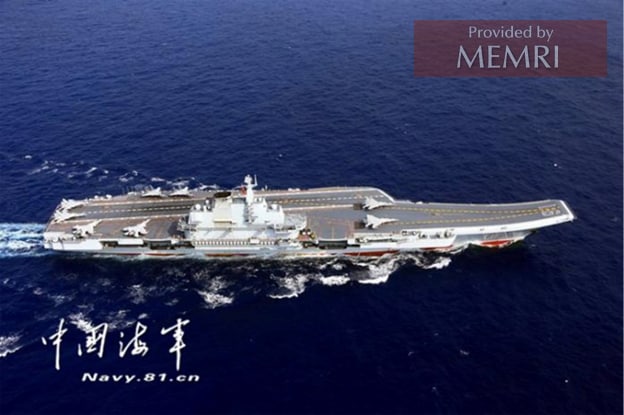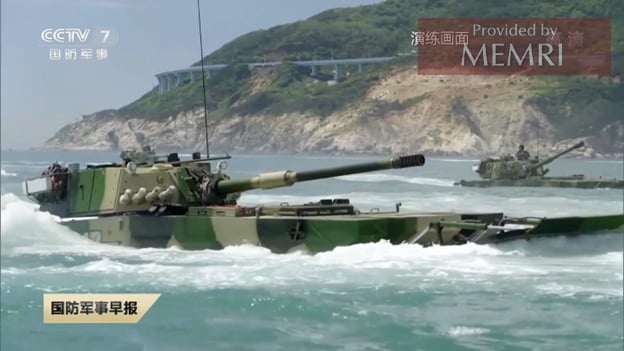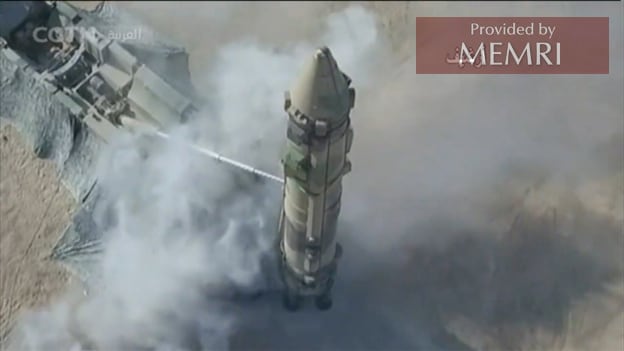President Biden made headlines during his inaugural trip to Asia when asked a comparative question between Ukraine and Taiwan. Within the context of his decision to not send U.S. troops to defend Ukraine against a Russian invasion, the President said that he would use force to defend Taiwan in case of a Chinese attack. He amplified his response by adding, "But the idea that it could be taken by force, just taken by force, is just not – it's just not appropriate. It will dislocate the entire region and be another action similar to what happened in Ukraine."[1] Notwithstanding similar statements of the past, and similar instances of the White House walking these statements back almost instantaneously, this is another indication that America's long-standing policy of strategic ambiguity is fraying. Moreover, it may also indicate an acknowledgment that in an era of great power competition, the effectiveness of deterrence is also fraying.
"Deterring The Chinese Communist Party From Its Often-Repeated Objective Of Bringing Taiwan Into The Embrace Of The So-Called Motherland Is Exponentially More Challenging Than Anything Seen In Europe"
The response of Western allies and like-minded countries to Russia's illegal and immoral invasion of Ukraine has been fairly resolute – economic sanctions against Russia accompanied by wide-spread condemnation and diplomatic isolation while simultaneously providing Ukraine with defense articles, intelligence, and strong moral support. Notably, Sweden and Finland have moved decisively to join NATO. These historic, and reactive, actions are to be commended. Yet, we must also acknowledge that this war, which has already lasted almost 100 days, is the result of the abject failure of deterrence. The West, led by the United States, undeniably, and unfortunately, failed to deter Russia's disastrous invasion of its neighbor. While the West can be proud of its support for the government and people of Ukraine since February 24, it must also admit that it was unable to deter Vladimir Putin from launching the largest ground assault in European history since the end of the Second World War a day earlier.
The overt Russian massing of forces along the Ukrainian border provided months of early warning of Putin's bellicose and kinetic intent, which he had previously demonstrated to great effect in 2014. In the intervening years, the West failed to deter a repeat of Russia's previous invasion of Ukraine and subsequent annexation of Crimea. More troubling, perhaps, was the fact that the West was not unified in its approach to deterrence. The Obama administration refused to provide Ukraine with lethal defensive aid in the face of Russian aggression. The German government proceeded with Nord Stream 2 construction with widespread domestic support, while the newly minted Biden administration appeared to give its approval as well. European reliance on, some might say addiction to, Russian gas and oil continued to grow. Ukrainian efforts to join the European Union and NATO were rebuffed, while member-states such as France and Italy cultivated their ties with Russia. With an economy 10 times the size of Russia's, global business entanglements and dependencies on Chinese supply chains and markets, the world's largest military, a growing nuclear arsenal, and an unwavering narrative, what does this portend for deterring a revisionist and aggressive China?

Source: Navy.81.cn
In short, deterring the Chinese Communist Party (CCP) from its often-repeated objective of bringing Taiwan into the embrace of the so-called motherland is exponentially more challenging than anything seen in Europe. If anything, the CCP is consistent. It has never waivered from its position that Taiwan is part of China and that "reunification" is inevitable. All of its leaders have parroted this statement over the decades, and punctuated it periodically with the threat of force. Its rubber-stamp legislature even passed the anti-secession law in 2005 to provide a legal basis to intervene militarily should Taiwan move too closely towards de jure independence. Most ominously, the People's Liberation Army (PLA) has spent decades developing doctrine, training, rehearsing, and equipping itself with one primary mission in mind – the amphibious invasion of Taiwan and corollary counter-intervention capabilities focused on the U.S. Militarily, the intent and the capability of the PLA are clear. If the CCP leadership cannot be deterred from military action against Taiwan, then the PLA is well-postured to strike.
"A Unified Approach As Introduced Nebulously By The Concept Of Integrated Deterrence Could Be Part Of The Answer To Complicating The Chinese Calculus"
SUPPORT OUR WORK

In the face of an increasingly capable PLA led by a revisionist CCP, the Biden administration has embarked on implementing a concept of integrated deterrence. A Pentagon official described integrated deterrence as "a framework for working across warfighting domains, theaters, and the spectrum of conflict, in collaboration with all instruments of national power, as well as U.S. allies and our partners."[2] While the Biden administration has published its Indo-Pacific Strategy which cites this concept, it has yet to publicly release a National Security Strategy and a National Defense Strategy (beyond a two-page factsheet) that clearly articulates what this new concept signifies and what concrete steps the U.S. is taking to strengthening deterrence vis-à-vis China.[3] In fact, it appears as if the People's Republic of China (PRC) is already steeling itself for the probability of facing the same type of reactive measures that Russia has endured post-invasion in case it moves against Taiwan.
Given the impact of the scale and scope of China's economy on global commerce, attaining international consensus and enforcement of sanctions would be difficult, at best. Russia's only real export is oil and gas, and it's been a challenge to wean the democratic world off that despite its open and brutal aggression against Ukraine. It would be exponentially more difficult to try to economically punish China if it attacked Taiwan, as countries, companies, and conglomerates would view it as mutually assured economic destruction. Moreover, China has already taken steps to mitigate the threat of economic boycotts and sanctions – by internationalizing the renminbi as a global currency, securing land routes for oil and gas imports, and encouraging domestic consumption as a growing alternative for its export driven economy.
In the court of public opinion, most of the free world would certainly condemn PRC aggression. However, the CCP has spent decades developing a consistent narrative of reunification under the auspices of law and the one-China principle. Furthermore, it would invoke "the three evils" of splittism, terrorism, and extremism to justify an invasion of Taiwan, much as the Russians have talked about ridding Ukraine of Nazis. The informational element of national power would certainly dominate within China's borders, and within its well-oiled propaganda machine internationally as well. Plus, every Chinese child has been taught, even brainwashed, from an early age that Taiwan is an inalienable part of the PRC. There would be little, if any, domestic Chinese opposition to a call to arms to fight a vilified Taiwanese resisting the inevitable.

Source: MEMRI TV clip No. 9024, Chinese Military Conducted Large-Scale Amphibious Assault And Island-Seizure Drill On China's Southeast Coast, July 29, 2021.
China's reach would also moderate potential diplomatic actions against it. Beijing holds a permanent seat on the United Nations Security Council, with its veto power. The PRC has spent enormous resources in the Middle East, Africa, and Latin America, not to mention in Europe and Asia too, that will be utilized to minimize diplomatic isolation. While a coalition of the willing would move to isolate the CCP regime, it will be tough going against a wave of countries that will not want to risk economic and other retaliation by Beijing. The countless examples of Chinese economic coercion against countries as diverse as Australia, Norway, Lithuania, and South Korea will serve as clear examples of what happens if you cross Beijing politically or diplomatically.
Militarily, the balance of power with China has clearly shifted since the 1996 Taiwan missile crisis, during which the U.S. was able to deploy two carrier strike groups into the region without fear of the PLA being able to do anything about it. Unfortunately, those times are no more. The PLA has developed, acquired, and fielded capabilities precisely to be able to put at risk U.S. aircraft carriers as well as other American forces in the theater and the homeland. This has caused U.S. defense planners to look at asymmetric options in deterring, and if necessary, defeating the PLA.

Source: MEMRI TV clip No. 8273, Arabic-Language Chinese TV Report Showcases Anti-Ship Missiles: We Have The Ability To Detect And Destroy Enemy Vessels In The South China Sea, Including American Warships, September 3, 2020
The chances for deterring Chinese aggression appear rather bleak. Particularly under Xi Jinping, the CCP consistently doubles down on policy decision however wrong, ineffective, or counter-productive they may be. The Great Leap Forward is perhaps the most disastrous example, while zero COVID and draconian lockdowns are but the most recent. An invasion of Taiwan would also be a disastrous decision on many levels, as China would pay a price for such naked aggression. Nonetheless, the CCP may not be deterrable from making such a costly mistake, depending on the scenario. So, while deterring the CCP may not be possible, that does not mean we should stop trying. It is certainly possible to complicate the Chinese calculus to cause some potential pause in its decision-making. Reports of opposition to and criticism of some of General-Secretary Xi's decisions, particularly in regards to a slowing economy and COVID fatigue, are growing, albeit still feeble.
A unified approach as introduced nebulously by the concept of integrated deterrence could be part of the answer to complicating the Chinese calculus. The U.S. government should do more to fully explain the concept while emphasizing the non-military elements of national power and building more international support for pushing back on Chinese aggression. Building economic resilience, diversifying supply chains, backing like-minded partners against Chinese coercion, and other pro-active actions are proactive building blocks foundational to strengthening deterrence. Such deliberate measures coupled with ensuring that the U.S. and allied military capabilities maintain a decisive edge, will undoubtedly shape Beijing's decisions.
Former Premier Wen Jiabao famously said that any small problem can, when multiplied by 1.3 billion – the size of the Chinese population at the time – become a big problem.[4] This truism is noteworthy, and it plays to the CCP's greatest fear of losing popular support at home. Leveraging this fear by an audacious and imaginative implementation of what could be a model of integrated deterrence is perhaps a course of action worth pursuing along all elements of national power.
*Heino Klinck is a Member of MEMRI's Board of Advisors. He served as the U.S. Deputy Assistant Secretary of Defense for East Asia, 2019-2021. As an Army Foreign Area Officer, he served as a military attaché in China, 2004-2010.
[1] Zolan Kanno-Youngs and Peter Baker, Biden Says U.S. Military Would Defend Taiwan if China Invaded, New York Times, May 23, 2022, available at Biden Says U.S. Military Would Defend Taiwan if China Invaded - The New York Times (nytimes.com).
[2] U.S. Department of Defense, Integrated Deterrence at the Center of Upcoming National Defense Strategy, March 4, 2022, available at Integrated Deterrence at Center of Upcoming National Defense Strategy > U.S. Department of Defense > Defense Department News.
[3] The White House, The Indo-Pacific Strategy of the United States, February 2022, available at U.S.-Indo-Pacific-Strategy.pdf (whitehouse.gov).
[4] Remarks of Premier Wen Jiabao, Turning Your Eyes to China, December 10, 2003, available at Remarks of Chinese Premier Wen Jiabao: 'Turning Your Eyes to China' (chinadaily.com.cn).




